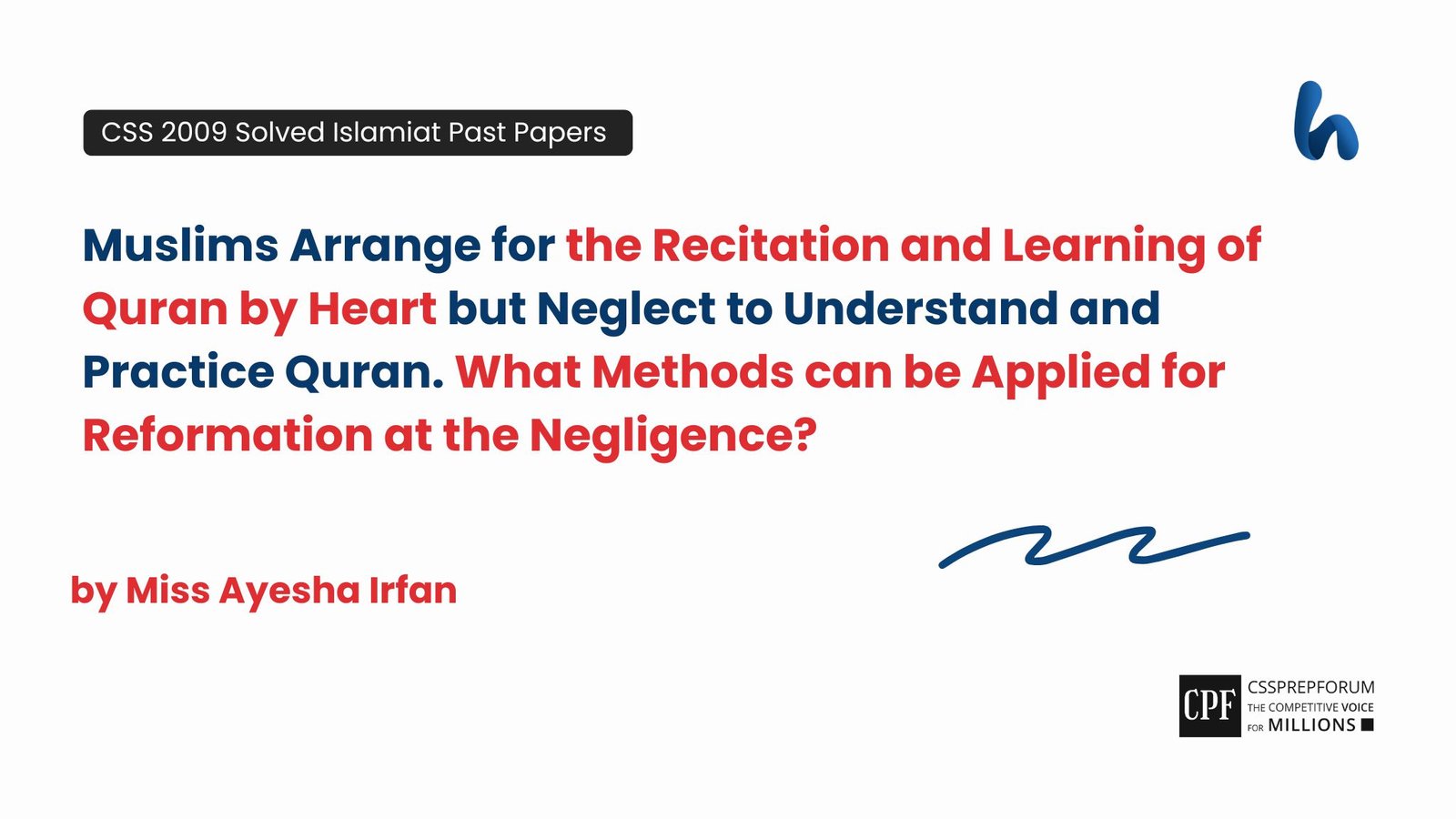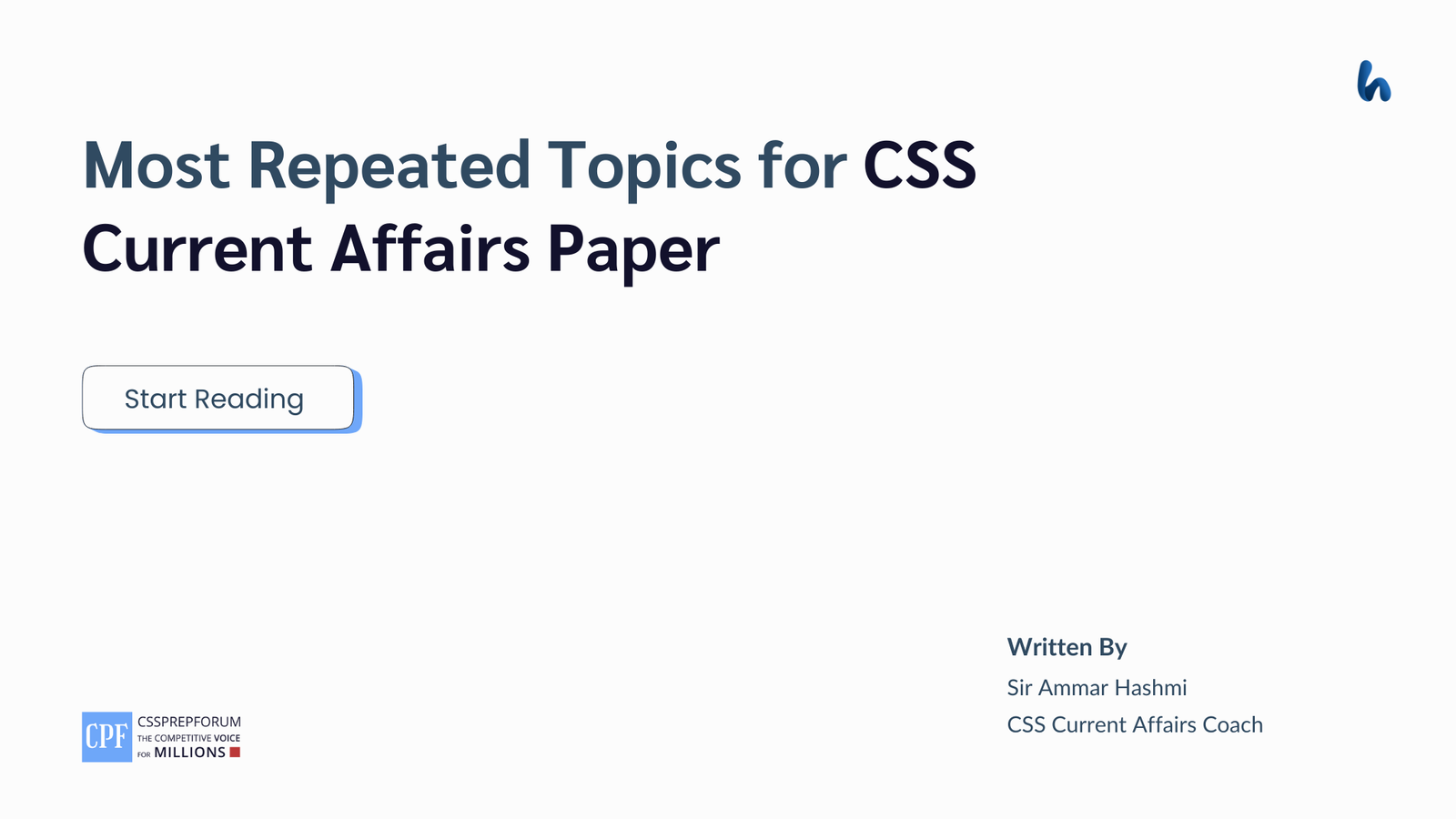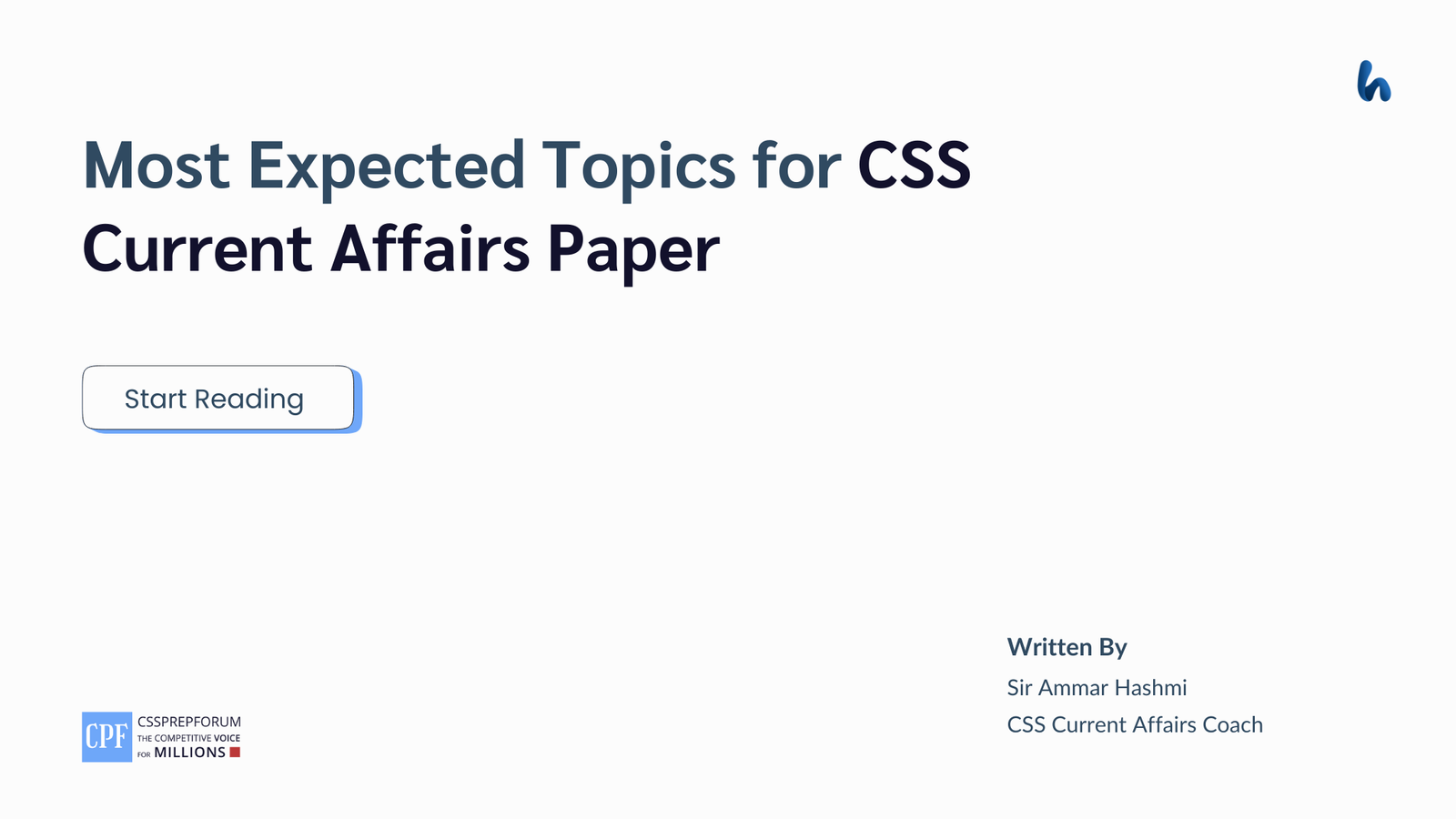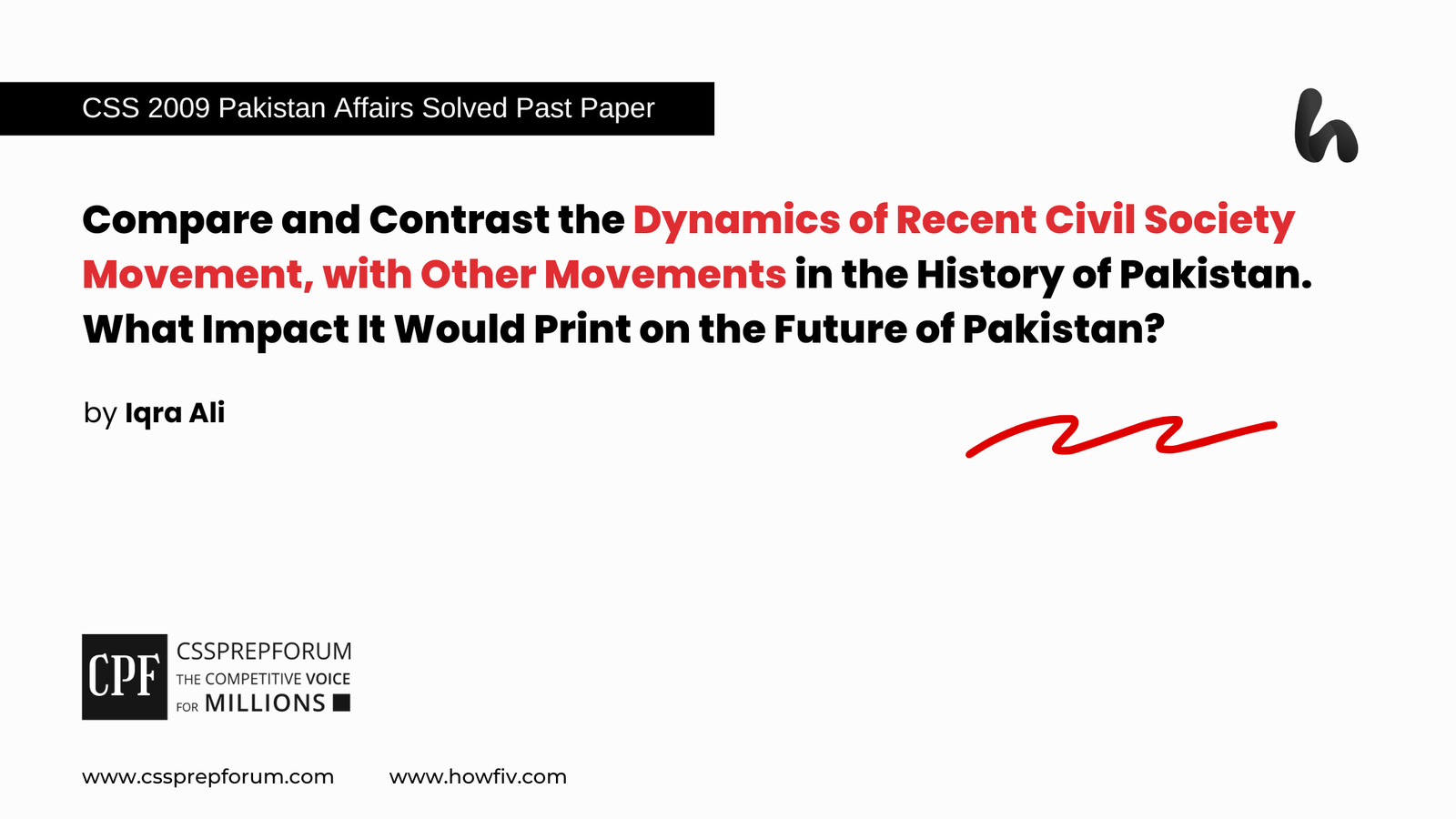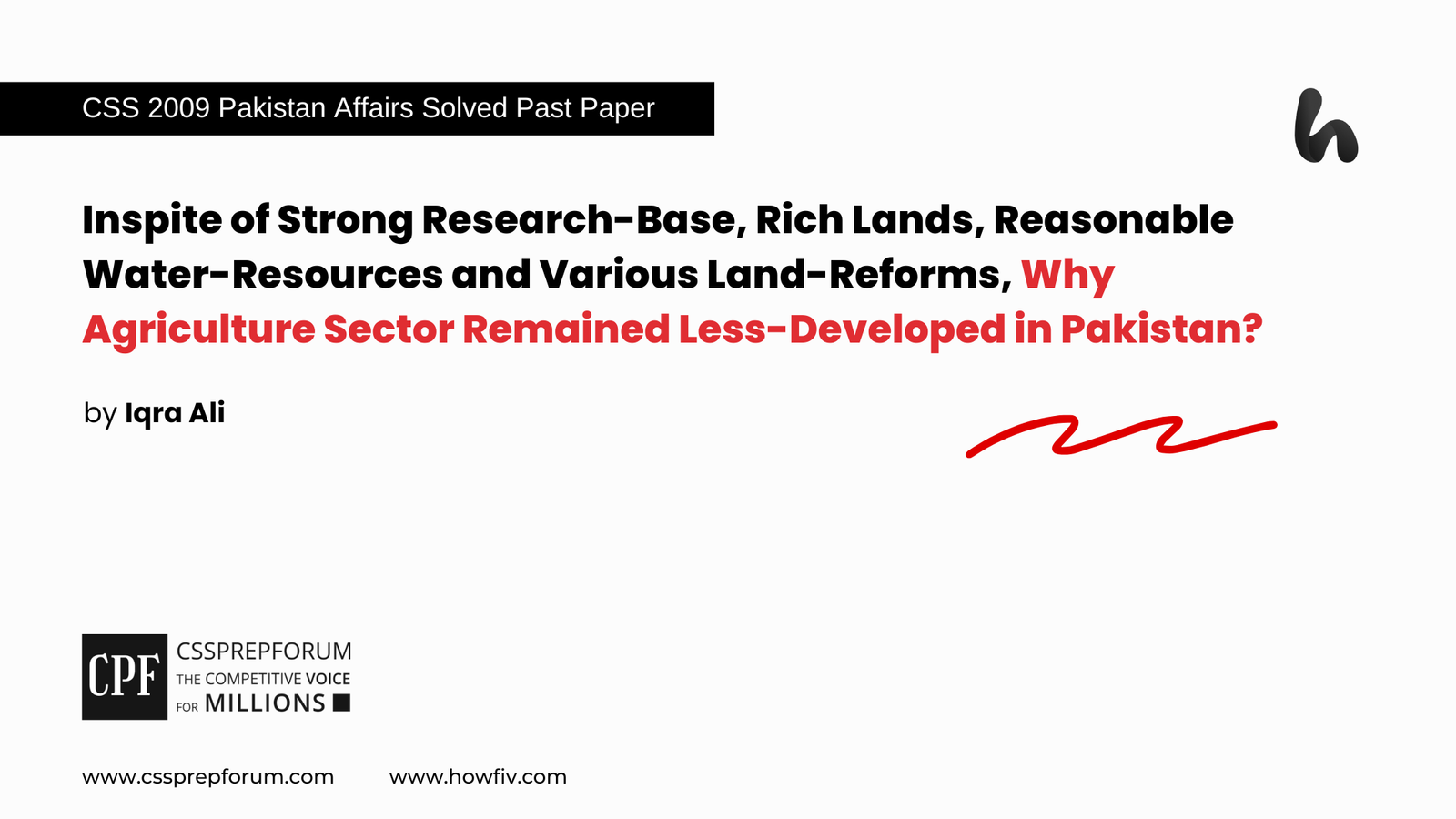CSS, PMS Solved Essays | Crisis of Good Governance in Pakistan: Causes, Impacts, and Remedies
The essay is attempted by Inspector Amna Shafique on the given pattern, which Sir Syed Kazim Ali teaches to his students, who have consistently been qualifying their CSS, PMS essays. Sir Syed Kazim Ali has been Pakistan’s top English writing and CSS, PMS essay and precis coach with the highest success rate of his students. The essay is uploaded to help other competitive aspirants learn and practice essay writing techniques and patterns.

Outline
Introduction
The imposing tower of miseries resting on Pakistan’s heart has its soul foundation in the presence of a crisis of good governance. It has started robbing the national notion of socio-economic stability in the country. However, pragmatic steps, such as reforming institutional efficiency, upholding accountability and ensuring transparency, can curb the menace of bad governance in Pakistan.
What is a governance crisis in its real sense?
A glimpse of the Governance Crisis in Pakistan
How has Pakistan been affected because of bad governance nowadays?
Why does Pakistan face the Crisis of Good Governance?
- Non-participation of citizens
- The Weak rule of law
- Absence of a transparent system
- Retarded responsiveness of institutions
- Lack of equity and non-inclusive decision-making
- Poor institutional efficacy and inefficiency
- Lack of accountability
- Lack of consensus among institutions
In what obstacles Pakistan has stuck itself?
Political impacts
- Political instability
- Political polarization
Economic Impacts
- Economic declivity
- Unemployment and poverty
Social Impacts
- Societal degradation
- National disintegration
Psychological Impacts
- Promotion of anti-state elements
- Tarnished image of the country
What available tools are there for Pakistan to religiously fix the crisis of good governance?
- To promote public-private partnership for effective administration
- To hold the culprits accountable by strengthening the transparency mechanism
- To equip the youth with equitable opportunities
- To uphold meritocracy in the recruitment process
- To reform bureaucracy for a better functioning
- To bring consensus among the political leadership at provincial and federal levels
- To revamp the criminal justice system
- To transform societal attitudes by effective use of media and technology
- To ensure access of the public to information
Critical Analysis
Conclusion

Introduction
The imposing tower of miseries resting on Pakistan’s heart has its soul foundation in the presence of a crisis of good governance. It has started robbing the country of the national notion of socio-economic stability. There is no doubt that good governance is the only tool through which Pakistan can settle all its monumental problems. However, the country has remained unable to sustain its political maturity and socio-economic development due to the prevailing crisis of good governance. Since independence, governance issues have been a part of the debate in Pakistan. The inefficient political leaders, multiple military interventions, and delay in constitution-making have manifested poor governance in the country. The plight of governance in Pakistan is due to the non-participation of citizens, the weak rule of law, and the absence of a transparent system. In addition to them, retarded responsiveness of institutions, non-inclusive decision making and poor efficiency of institutions increase the woes of a governance crisis. It is certain that in the absence of good governance, the country cannot integrate into the international economy, and these conditions will lead it toward chaos and instability. Moreover, it cannot drive its people out of poverty; thus, social degradation and the promotion of anti-state elements is inevitable. Now, Pakistan is at a crossroads. It needs to reform its institutional structures by promoting public-private partnerships for effective administration. Furthermore, reforming bureaucracy for better functioning, ensuring accountability, and revamping the criminal justice system would enable Pakistan to achieve its desired position among nations. The need for governance has been rightly remarked by Benigno Aquino, “With proper governance, life will improve for all”. This essay throws light on the crisis of good governance, its socio-economic and political impacts, and the available tools to fix this crisis.

Governance simply implies the manner and actions governing an organization or a state. It finds its deep roots in the country’s administration, and so is the case in Pakistan. For the first time, the concept of governance was introduced in the late 1980s by the United Nations to elaborate on the acute social problems in sub-Saharan Africa. For decades, governance issues have been a part of the debate in Pakistan, stressing their impact on the daily lives of the masses. Unfortunately, Pakistan has been unable to take practicable steps to solve its governance crisis, thus weakening the socio-economic fabric and political institutions and destroying the precious future of its generations. In order to be seen through the prism of modern economies, Pakistan must ensure exemplary governance, as it is the key to stability and prosperity. Etounge Manguella remarked, “Good governance implies the presence of the rule of law, safeguard of human rights, the existence of honest government, accountability, transparency, predictability and openness.”
Good governance has always been an important issue since the inception of Pakistan. It is evident that the country has always been affected by instability in the political system, both by the civilians and military regimes. Moreover, the delay in constitution-making has also aggravated the country’s governance system. Although Pakistan is rich in resources, its poor management has wreaked havoc on the persistent economic crisis. The quantum of good governance relies on the efficient working of state organs; however, in Pakistan, state institutions face a shortage of accountability, transparency, meritocracy and the weak rule of law. The country is not a collapsed one, but a governed state, lacking equity and non-inclusive decision-making. Therefore, the crisis has resulted in political instability, economic declivity and societal degradation. Moreover, the country is dominant in a race of nukes but crawling on the belly in terms of human development. This has accelerated the poverty and unemployment rate. It has been seventy-four years since Pakistan came into being, but it cannot ensure sustainable growth because the Pakistani political leadership has not learned from their previous mistakes. Furthermore, some power-hunger politicians are trying to topple the elected government on the pretext of massive rigging in the 2018 Elections. Until this political thinking prevails, Pakistan cannot materialize its dream of good governance. As Quaid I Azam stated,
“If we want to make this great State of Pakistan happy and prosperous, we should wholly and solely concentrate on the wellbeing of the people and especially of the masses and the poor.”
Astonishingly, the governance crisis does not revolve around any one factor; it is ingrained in various structural factors. The policy to keep the majority aloof from administrative matters lies at the heart of this evil.
Appallingly, it results in a reactive policy instead of a proactive one; the persistent natural gas crisis in winter every year stands evident to this docile policy. Furthermore, lack of transparency results in the exploitation of resources, which in turn is aided by the weak accountability system. According to the latest transparency index report, Pakistan ranks 124 among 180 nations, which means it does not do enough on the governance parameter. Besides this, the accountability institutions of Pakistan are unable to perform their duties as credible independent organizations. Dejectedly, they have become a tool of political victimization in the hands of governments; consequently, the incapacity of the institutions to enforce across-the-board accountability is adding fuel to the fire. As a fact, Pakistan has been entangled between the devil and the deep blue sea, making the country lag behind politically, socially and economically. Moreover, the gap between the masses and the ruling elite continues to widen, aggravating the governance crisis further into a trench.
In addition to the unaccountability across the board, the weak rule of law is a significant hurdle that exacerbates the crisis of good governance in Pakistan. As a result, meritocracy has merely become a dream, concentrating power only in a few hands. Furthermore, the absence of an uninterrupted local government system has also played its part in weakening the country’s governance structure. Similarly, the lack of coordination among institutions is a severe predicament to the prevailing crisis, as the house divided cannot stay long. Evidently, the meagre political system, uprooted on various occasions, has also been an obstacle to consensus building. Therefore, a sense of insecurity is depicted in the Politicians, trying to consolidate power only with their trustworthy people. However, this non-inclusive decision-making has become a double-edged sword; on the one hand, it makes ineffective decisions, and on the other, inefficient by adding to the lengthy procedural complications. Above all, the slow solution of complaints and inability to utilize the resources and opportunities at best have further aggravated Pakistan’s governance structures. The significance of timely decision making is correctly described by Piyush Goyal, “The speed of decision making is the essence of ensuring good governance”. Thus, it is a fact that many factors contributed to making poor governance a daemon, severely impacting the political, economic and social well-being of the masses.
Like every problem has some impact, poor governance gives birth to political instability and socio-economic chaos. Instead of fulfilling its tasks and duties, the corrupt bureaucracy gets involved in political engineering and wreaks havoc on the governance system of Pakistan. Besides this, political polarization, another outcome of bad governance, divides the country into religious, ethnic and cultural domains. As a result, the sense of unity and feelings of nationalism disintegrate, which fuels the cultural provincialism in the country. It is evident in Pakistan that the facts and moral truths are losing weight due to political vote blocs. Furthermore, the opposition leaders leave no stone unturned to thwart the political policies and projects of the incumbent government; consequently, the leg-pulling attitude of the opposition causes hindrance and delay in political policy implementation. Thus the country fails to overcome this crisis and disintegrates due to political polarization. A.P Memon rightly says it
“The unstable government, inefficient political parties and a weak political culture create a scenario of poor governance for a politically unstable state”.
Apart from political instability, economic declivity has grabbed its hold in Pakistan. It is a fact that economic growth is a driving force in reducing poverty. Still, the experience has shown that poor governance has significantly impaired the country’s economic progress. As a result, unemployment and poverty rates have increased with time. According to the multidimensional poverty index (2016), around 39% of the population lives in poverty. Thus, bad governance misallocates the resources; consequently, this resource inequality allows the elite to subvert the political regulatory and legal institutions for their gains and oppose institutional reforms against their vested interest. Therefore, these conditions give birth to inequality, and the state fails to provide employment opportunities and other basic services to its people. However, the poor governance of Pakistan has failed to implement economic policies to alleviate poverty. M.H Mushtaq has aptly remarked, “Good governance drives economic development”.
In addition to Pakistan’s political and economic crisis, the deterioration of the social fabric has led to moral bankruptcy. Likewise, Pakistan’s society has obviously become a victim of moral degradation. The changing moral fabric and cultural norms of a country induced moral panic, moral transformation and status anxieties within the public. As a result, people violate laws, traffic rules, and other common violations that create distress. Moreover, the use of foul language is common among traffic wardens and health officers everywhere. Thus the governance system has failed to implement strict punishments in the different sectors; consequently, social chaos has ridden the societal peace. Besides this, national integration is strongly dependent on good governance at the national level, where all rights are equally respected without any linguistic, regional or cultural identities. Although Pakistan is multilingual, multicultural, multiethnic and multi-religious, the crisis of good governance has exacerbated the issues of national integration.
Last but not least, the poor governance structure in Pakistan has given a constant mental dither to its masses. As a result, the anti-state elements create a disturbance and spread anarchy. Besides this, a negative image of Pakistan has been portrayed around the globe; consequently, the worth of the Green Passport has been lost, and Pakistanis are perceived as unethical, unprincipled and corrupt individuals. Thus, Pakistan has paid scant attention to providing good governance not only in recent times but throughout its history.
Ibne Khaldun said, “Throughout history, many nations have suffered a physical defeat, but that has never marked the end of a Nation. But when a Nation has become the victim of a psychological defeat, then that marks the end of a Nation”.
As every problem has a solution, there are specific ways to improve the governance structure in Pakistan. The first and foremost option is to promote Public-Private Partnerships for the effective administration of public institutions. Unfortunately, the country’s different sectors, such as the Pakistan Steel Mill and Pakistan International Airline, are responsible for aggravating the financial burden on the country’s economy. According to Prime Minister Imran Khan, the Pakistan Steel Mill is the largest loss-making unit, costing 17 billion rupees a year. Therefore, a Public-Private Partnership is important to keep losses at a minimum level. Moreover, an unbiased accountability system is an indispensable tool to strengthen the governance mechanism and curb irregularities in the institutional processes. Although the National Accountability Bureau holds politicians accountable, it must uphold unbiased accountability towards all public institutions and their officials. Quaid e Azam said, “With faith, discipline, and selfless devotion to duty, there is nothing worthwhile that you cannot achieve.” It is proved from the above saying of Quaid e Azam that a nation can achieve whatever it wants without involving any corruption.

In addition to accountability, another significant step is to equip the youth with an equitable opportunity in all sectors and uphold meritocracy in the recruitment process. According to the Trading Economics Global Macro Model, the unemployment rate in Pakistan would reach 5% by the end of 2021. Therefore, it is the need of the hour to abolish nepotism and uphold merit in the recruitment process. Moreover, the provision of equal opportunities would provide equal chances to all the applicants and encourage them to participate positively. Furthermore, the reforms in the bureaucracy would focus on capacity building and training programs, which will enable the civil servants to strengthen their capabilities to respond to the humanitarian crisis. Moreover, an inclusive approach of involving the people and the stakeholders in the decision-making by the field officers of the administrative services would result in the effective and efficient delivery of services.
Besides bureaucratic reforms, the consensus among the political leadership at provincial and federal levels and revamping the criminal justice system are essential elements for good governance. The consensus among politicians on different matters, such as E-voting and free and fair elections, can curb political rigging; the present government’s focus on constitutional developments of provincial set-ups and the independent functioning of the Election Commission of Pakistan can improve governance. Besides political consensus, reconstructing the criminal justice system is the need of the hour; consequently, it would eradicate criminalization based on sex, gender and equality. The following quote of Quaid e Azam throws light on the importance of law and order. He stated, “The first duty of a government is to maintain law and order so that the life, property and religious beliefs of its subjects are fully protected by the. Last but not least, a change in social attitude towards politics and free flow of information to the public would create awareness among the masses and arouse positive feelings towards politicians and administration. As the role of media has impacted the social, economic, and political aspects of a nation, advanced technology and updated information and its access to people would reduce the crisis of governance in Pakistan.
Pakistan needs bold steps to be taken to be placed on the list of countries with good governance, where it may gain respect and honour in the international community. However, since its inception, it is evident that it has not been on sustainable economic growth, social progress, and cultural development. The reason is that Pakistani political leadership has not learned from their previous mistakes. And, when formidable challenges have surrounded the country, some power-hunger politicians are trying to topple the elected government on the pretext of massive rigging in the 2018 Elections. However, it’s the government, and all the institutions of the state and the masses as well are responsible for such a deteriorated society of Pakistan. To conclude, governance impacts a country’s affairs socially, politically and economically.
In a nutshell, good governance in Pakistan would pave the way toward building morale and upright institutions. Thus, to resolve the governance crisis, there is a need to implement an actual model of democracy that can actually deliver services to its citizens. Moreover, the country cannot flourish until it has skilful leadership, strong accountability, the rule of law and meritocracy. However, national integration and social transformation are essentially needed to root out poor governance. Likewise, coordination among public and private sectors for the uplift of state institutions; and reforms in bureaucracy would promote good governance in the country. Unless the governance crises are not curbed, socio-economic growth and political instability are inevitable. According to Jairam Ramesh, “There never is a good time for tough decisions. There will always be an election or something else. You have to pick courage and do it. Governance is about taking tough, even unpopular decisions”.
CSS Solved Past Papers’ Essays

Articles Might Interest You!
The following are some of the most important articles for CSS and PMS aspirants. Click on any to start reading.


